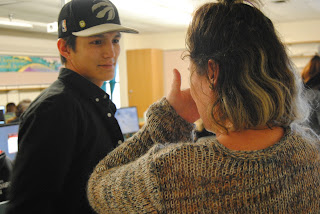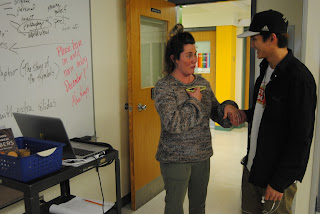Kaleya McNabb, Lacey Missens, Taish Desnomie, Mr. Corey O'Soup, Malynda Starr-Desnomie, Ms. Tami Janz-Sargees
Raimey Pasqua and Michael Starr-Desnomie
Mrs. Koops: What was most memorable about meeting Mr. O’Soup?
Michael: He brought some awesome cinnamon rolls. While I was
listening to him and taking pictures, he gave me a couple of ideas that I want
to do next with this little program. Try to join him as well, try to help kids
feel more safe and more welcome. All kids need to go home safely, and they all
need to be treated the same as they would be treated by family, loving one
another, respecting one another, always being there for them. Bullying is not
the way. When people are bullied it pushes them to the limits, even being
suicidal. Even the book that he gave us has lots of information about we could
do, what we could take action for. I like what he said, we could help him with
this work. People will listen to younger people, we’re getting out there in the
world. We need to let everybody know about this.
Michael enjoying the best cinnamon rolls ever.
Malynda: He shared with us that when an older person speaks, you hear what they
say, but when a younger person speaks, we reflect on it more because we know what they
mean. When you get someone your own age, you know they’ll understand. The older
generation doesn’t really have the same problems as us.
Mr. O'Soup speaking to us in the classroom.
Taish: I think that each kid, each youth, teenager,
pre-teen, kindergartener, should just get a piece of paper and write down what
they’re feeling, where they are in their lives, where they are coming from, to
reach out and talk to somebody, could be anybody, somebody close, mom, dad,
teacher, or a friend, and try and find that help to overcome their fears of
whatever’s bothering them, to find that courage inside of themselves to know
that they’re not alone.
Taish exchanging ideas with Mr. O'Soup.
Mrs. Koops: What was inspiring about our meeting with Mr. O’Soup?
Michael: Everything. Everything that he said. As young
leaders like us, we could do something about it because we’re family.
Discussions after we'd finished lunch.
Malynda: The whole time he was talking I was inspired and moved by what he was saying. That guy’s going to do some
awesome things.
Malynda listening to every word.
Mrs. Koops: What are you taking away in your heart, as a
youth, after the meeting?
Malynda: When he was talking about social work, I really
want to go into social work after high school, he’s trying so hard to make the
whole system better and not so twisted as it is right now. With him having the
platform that he has, he can really make change in those areas so that makes me
feel better and more confident in wanting to pursue Social Work.
Mr. O'Soup sharing his story with us in the classroom.
Mrs. Koops: What does it mean to you that he is the first
Indigenous Child Advocate in Saskatchewan?
Malynda: Hearing his life story. How humble he is, and just
overall how great of a human being he is, making history. I feel so much more
uplifted as an Aboriginal person because I see what he’s trying so hard to do.
I’m really excited to see where he’ll take us and all the positive affects he’ll
have on this province and country. We shouldn’t be restricted that we can only
get a certain level of job. He is raising the bar for us, like, we can do it.
Mr. O'Soup gave us all copies of the newly released
Shhh... LISTEN!! We have something to say! Youth Voices from the North
Taish said, "Will you sign mine."
Everyone else said, "I want mine signed, too."
Mr. O'Soup wrote, "Michael, where's my poem?"
Michael ran home and brought back a copy of his poem and gave it to Mr. O'Soup.

















































